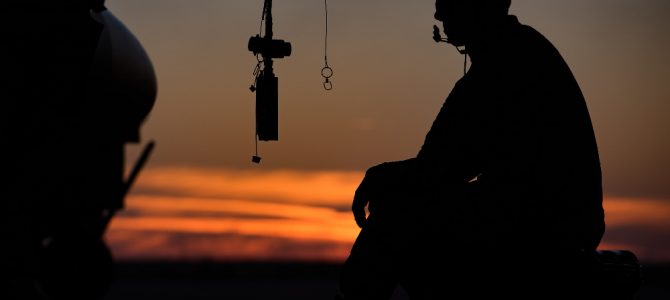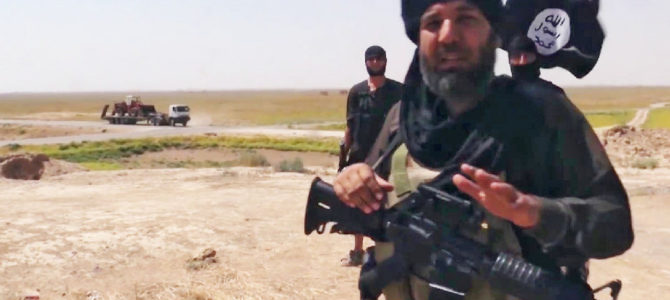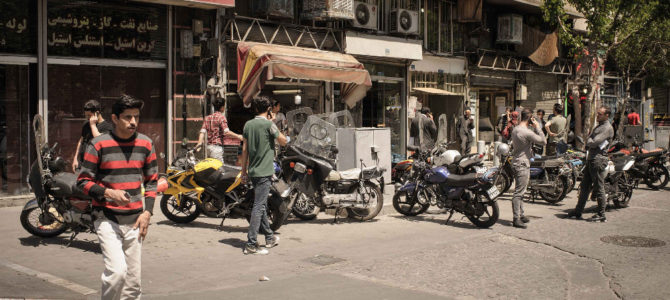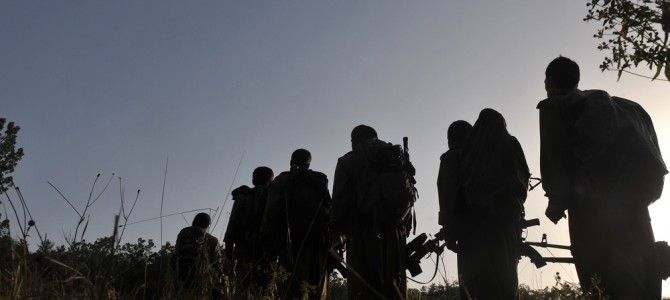
ISIS is losing more and more territory in Syria and Iraq, but what about its holdings elsewhere in the Middle East, Africa, and Southeast Asia? As ISIS continues to be squeezed by Iraqi, Syrian, and Turkish forces, it may look to these regions as places to regroup or form a kind of backup caliphate. We should also expect it to continue changing its tactics as it tries to survive.
The U.S.-led coalition in Iraq is continuing to push ISIS out of Mosul, Iraq’s second largest city, after moving into eastern Mosul last month. Last week, Iraqi forces took over the Mosul airport and began to move into the western half of the city, where they have already retaken one neighborhood. Although western Mosul is expected to pose more of a challenge, Iraqi officials predict the battle for Mosul will be over by the summer.
As ISIS’ territorial control weakens in Iraq, the Iraqi air force launched airstrikes across the border for the first time last Friday, a sign of its resolve to destroy the group. Meanwhile, ISIS is losing control of its stronghold in northern Syria as it faces losses on multiple fronts. Turkish-backed Syrian rebels routed the Islamic State from the strategic city of al-Bab, while over the weekend, Syrian forces took neighboring territories held by ISIS.
These victories have come with setbacks, of course. Although Iraqi officials declared eastern Mosul “liberated” last month, ISIS sleeper cells have continued to launch attacks there and the group is using increasingly sophisticated drones to drop grenades on civilians and aid workers. Residents also report that neighborhoods that were supposedly cleared still contain many ISIS sympathizers. In response to losing al-Bab, ISIS retaliated with car bombs late last week that killed more than 60 people. ISIS is also engaging guerrilla warfare. In February, ISIS detonated a car bomb in the Shiite suburb of Sadr city outside Baghdad that killed at least 48 people.
The Sinai Peninsula
ISIS set up shop in Egypt’s Sinai Peninsula in late 2014, under the moniker ISIS-Sinai Province, or just Sinai Province. In October 2015, the group bombed a Russian airliner on its way to the resort town Sharm-el-Sheikh, killing all 224 on board. Sinai Province is violently opposed to the government of President Abdel Fattah al-Sisi, who banned the Islamist Muslim Brotherhood after coming into office.
Sinai Province is allied with Hamas, a Muslim Brotherhood offshoot, working together on smuggling tunnels running from Gaza and the Sinai Peninsula. This has led to an unusual level of cooperation between the Egyptian government and Israel. In return for choking Hamas tunnel access to Egypt, the Israelis have been helping the Egyptian military fight Islamic State on the Sinai Peninsula. ISIS has launched several rocket attacks into Israel, including twice last month.
Last week, Islamic State released a video instructing its followers in the Sinai Peninsula to target Coptic Christians. Several Copts have been killed in the last ten days, causing 118 Coptic families to flee the region since last Thursday. In December, an ISIS suicide bomber targeted a Coptic cathedral in Cairo, killing 25.
Pakistan and Afghanistan
Pakistan and Afghanistan are experiencing increasing problems with ISIS as the group has worked to expand its presence in Southeast Asia. The ISIS affiliate, ISIS-Khorasan Province, or ISIS-KP, claimed responsibility for the bombing of a Sufi shrine last month in Pakistan that killed 88 people, as well as a similar bombing in November that killed 50.
ISIS-KP emerged in Pakistan and Afghanistan in early 2015. Its leadership is comprised mainly of Tehrik-i-Taliban Pakistan (TPP) and Afghan Taliban defectors. Their base is in Afghanistan, although the porous border between the two countries allows militants to pass easily back and forth. Pakistan has accused Afghan officials of refusing to take action against the group and has taken punitive actions like closing border crossings that are key to trade between the two countries. Although long reluctant to admit ISIS’ presence in Pakistan, officials finally acknowledged in September that the group poses a serious threat to the country.
ISIS has been trying to establish a caliphate in Nangarhar province in eastern Afghanistan, but according to the top U.S. general in Afghanistan, the group has lost control of several districts in that province over the past year. However, ISIS still poses a significant security threat as it continues to attack the military and Shiite communities. Last month alone, ISIS killed 17 Afghan soldiers, gunned down six Red Cross aid workers, and launched a suicide bomb outside of Afghanistan’s Supreme Court that killed at least 20 people. The United Nations reported that civilian casualties from ISIS attacks increased by a factor of ten from 2015 to 2016 in Afghanistan.
Libya
When ISIS emerged in 2014, it took advantage of the failed Libyan state to gain a foothold along its coast. Remember that after Muammar Gaddafi was deposed and murdered, the country descended into a violent civil war. ISIS’ stronghold was in Sirte, although it also held territory in Benghazi, Tobruk, and several other areas. It was on a Libyan beach that ISIS beheaded 21 Egyptian Christians in a graphic propaganda video.
After a seven-month-long campaign, which included U.S. airstrikes, ISIS was driven from Sirte. However, ISIS is still considered a threat. The group is thought to be regrouping in the desert, forming underground cells throughout the country, and continuing to attack the Libyan military and plotting attacks in Europe. In January, U.S. planes bombed two ISIS training camps, killing 80.
Yemen and Somalia
Much like in Libya, ISIS has taken advantage of the ongoing civil war in Yemen to insert itself and gain territory. The group continues to launch multiple suicide bombings and attack Yemeni military forces. ISIS is not as powerful nor does it hold as much territory as al-Qaeda does. However, as ISIS loses ground in Syria and Iraq, there is increasing concern that militants will join its affiliate in Yemen.
ISIS first emerged in Somalia in 2015 as a small group that broke away from al-Shabaab, the Islamist group loyal to al-Qaeda. Last fall, ISIS in Yemen briefly seized a town along the coast and last month attacked a hotel in the Puntland region. While their presence in Somalia is believed to be small and much inferior to that of al-Shabaab, Somalia is a de facto failed state and would be a relatively easy place for militants in Syria and Iraq to flee to and regroup.
This Is a Global War that Requires Global Cooperation
As ISIS continues to face territorial losses in Iraq and Syria, we should expect to see more drone attacks and suicide bombings in these two countries, much like al-Qaeda’s guerilla warfare tactics. We may also see ISIS look toward its holdings, both large and small, from Africa to Southeast Asia, as a way to reorganize and begin their project anew.
To defeat ISIS in these countries, or prevent their small presence from metastasizing, each country will need to have the resolve and the resources to pursue them aggressively. Quasi-failed states and countries bogged down in violent civil wars will struggle to do this. The United States must promote stability in these countries if we want to see ISIS’ influence and violence to come to an end.
Countries where ISIS has gained a foothold will also need to be open to coordination across the border. This will prove difficult for some, like Pakistan and Afghanistan, who have ongoing border disputes and are deeply distrustful of one another.
ISIS is a global problem and will require a global solution. This means stability, determination, and cooperation. It may also necessitate leadership from a major world power. But in today’s climate of populist nationalism, Western countries may be reluctant to come forward. Unfortunately, that leaves Russia and Iran to fill the void—unless and until the United States decides to take up its discarded mantle of leadership.









